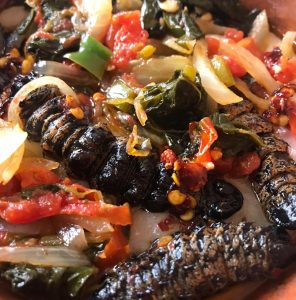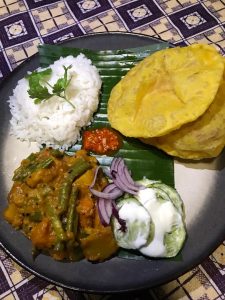

THERE was a time when wearing a mask was the preserve of doctors and nurses in operating theatres, felons planning bank robberies and the occasional geeky-looking individual on public transport or in the supermarket.
It’s almost a year since 30 March 2020, when President Mnangagwa declared the coronavirus pandemic to be a national disaster, and decreed a three-week national lockdown. Since then, looping the elastics of a mask over one’s ears before leaving the house has become almost second nature, partly to avoid spreading the virus, and also to avoid a fine of $1,000.

Mopani worm tapas from De Ankarra
Instead of being a time to take on exciting new projects, travel around the country and make new friends, 2020 proved to be a year of loss and destruction. Some have lost more than others, but everyone has had to make changes in their lifestyle; where jobs have been lost, the challenge has been to find new ways to make a living.
In the hospitality industry, hotels, restaurants and travel have been particularly hard hit. When everything came to a screeching halt in March, Meikles Hotel was the only hotel, for some months, to remain open. ‘Since Meikles Hotel opened in 1915, the doors have never been closed,’ said General Manager Tinashe Munjoma proudly, when I interviewed him recently on WhatsApp.
With zero occupancy, only a skeleton staff was required for cleaning the empty rooms, but in mid-May, when several metric tonnes of Personal Protective Equipment (PPE) for health and medical workers in Zimbabwe arrived at the airport, crew members checked in to the hotel. With the resumption of Emirates flights into Harare occupancy is picking up. There is a glimmer of light at the end of the tunnel, says Munjoma, and renovations of this historical five star hotel are due to commence in April this year.
Zimbabweans love to eat out, and in the Before Time there were numerous food outlets to choose from, ranging from roadside shacks to upmarket restaurants. Put out of business by the pandemic, vendors are no longer selling roasted maize on the corner of Teviotdale Road, and restaurateurs, unable to serve sit in diners, have turned to takeaway and delivery service meals. Business is reduced to 15% of previous levels, but overheads haven’t decreased and staff on furlough while waiting for restaurants to re-open, still have to be paid.

Virtual trip to India withDe Ankarra Chefs butternut curry and rice
Many people eking out a living on the streets of Harare from dawn to dusk are happy to be able to buy a takeaway meal before returning home. Others, whose lifestyle revolves around dining out, may have tried with limited success to re-create the meals they once enjoyed at their favourite restaurants. Frequent culinary disasters and the spectre of washing up afterwards, will inevitably lead these individuals (myself included) to ordering a takeaway to eat in front of the TV. Hospitality influencer and legendary chef Alain Ducasse, who owns 30 restaurants in Paris, London and Las Vegas, cannot come to terms with takeouts. ‘Having a meal delivered is not life,’ he says.
Small scale farmers and suppliers will also have suffered a decline in business during lockdown. The demand from restaurants for tomatoes and onions from Domboshawa, small grains from farming centres in Mutoko and free-range guinea fowl from Mt Darwin will have decreased, leaving farmers pondering alternative ways to make a living.
Talented young and mid-career professional chefs, eager to contribute to the culinary arts in Zimbabwe, are also finding it difficult to make their way in the stalled hospitality industry.
De Ankarra Chef, aka Tafi Anifasi, is a personal chef who hosts special events and prepares specialised meals for clients. He has spent a quiet 2020 on his farm in Kwekwe, honing his culinary skills and planning for a post-pandemic future.
Blessed with an adventurous and highly-developed palate, De Ankarra Chef has created an Afro-fusion cuisine blending the many flavours encountered on his travels locally, and in Italy, Ethiopia, Botswana and Kenya. The latest mouth-watering creation to appear on his Instagram account is a dish of jerk-flavoured pork trotters simmered in a rich chocolate sauce, on a bed of peanut butter rice, with a side dish of cinnamon-flavoured butternut. Tafi’s jerk seasoning is home made, a combination of cumin, nutmeg, allspice, smoked paprika and cinnamon, with red pepper flakes for heat and brown sugar for depth of flavour.
On a virtual visit to India during lockdown, Chef presented his fans with a plate of butternut curry tempered with fresh green chillis, Malawi rice, tenderly flaking puris and a raita of yoghurt and thinly sliced magaka (horned melon).
De Ankarra Chef already grows butternut and chillis on his farm, but he plans to focus on a range of micro herbs and edible flowers, to add a burst of colour and intensity to almost every dish.
Many people feel that where all protocols are in place, a restaurant is a safe place to be. Bongai Zamchiya, president of ROAZ (Restaurant Operators’ Association of Zimbabwe) is concerned about the thousands of jobs lost during lockdown. When safe sit-down dining is introduced, jobs can be salvaged, and lives saved. Zimbabwe’s culinary arts will flourish, and eating out will once more be an adventure.
A Matter of Taste Charlotte Malakoff
Comments to: cmalakoff@gmail.com